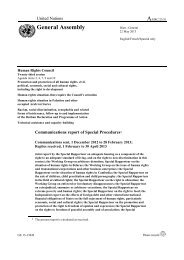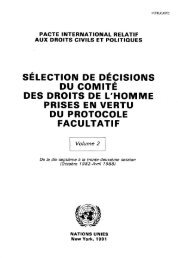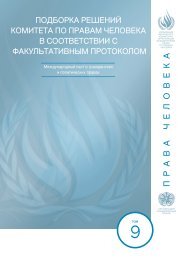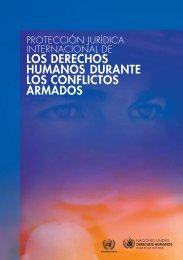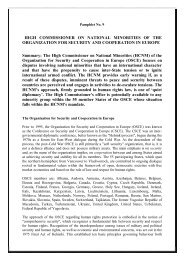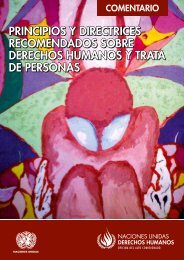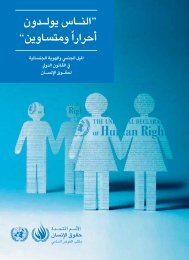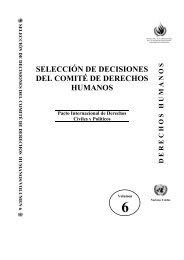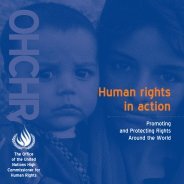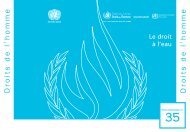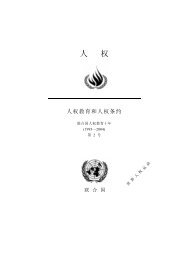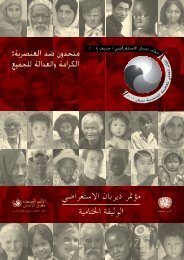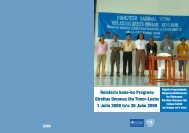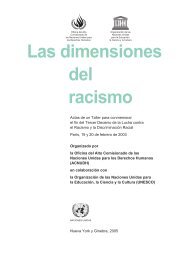good governance practices for the protection of human rights
good governance practices for the protection of human rights
good governance practices for the protection of human rights
You also want an ePaper? Increase the reach of your titles
YUMPU automatically turns print PDFs into web optimized ePapers that Google loves.
quently led to physical and psychological injury which ei<strong>the</strong>r proved irreversible<br />
or required long-term treatment. Second, <strong>the</strong> injury had <strong>of</strong>ten been aggravated<br />
by discrimination in employment and in society, which deprived victims <strong>of</strong> <strong>the</strong>ir<br />
livelihoods so <strong>the</strong>y could not af<strong>for</strong>d health care <strong>for</strong> <strong>the</strong>mselves and <strong>the</strong>ir families.<br />
This situation continued even after <strong>the</strong> return to civilian rule.<br />
Design<br />
The first impetus <strong>for</strong> <strong>the</strong> creation <strong>of</strong> PRAIS was given by <strong>the</strong> discovery in 1990<br />
<strong>of</strong> a mass grave near <strong>the</strong> town <strong>of</strong> Iquique, which was used as a detention centre<br />
during <strong>the</strong> dictatorship. In response, <strong>the</strong> Ministry <strong>of</strong> Health implemented a programme<br />
providing health care to <strong>the</strong> relatives <strong>of</strong> victims in several neighbouring<br />
cities. Subsequently and following a recommendation <strong>of</strong> <strong>the</strong> National Commission<br />
on Truth and Reconciliation, PRAIS was <strong>of</strong>ficially created in 1991, and operated<br />
until 1993 with international financing. The Ministry <strong>of</strong> Health took over its<br />
financing in 1993.<br />
PRAIS has two main aims. First, it <strong>of</strong>fers free access to <strong>the</strong> public health-care system<br />
to directly affected persons, including those who have gone through a traumatic<br />
experience, and <strong>the</strong> members <strong>of</strong> <strong>the</strong>ir immediate family. Second, it <strong>of</strong>fers free<br />
specialized mental health care by teams <strong>of</strong> psychologists, psychiatrists, nurses and<br />
social workers with experience in treating victims <strong>of</strong> repression and violence.<br />
The beneficiaries <strong>of</strong> PRAIS include close blood relations (parents and siblings) and<br />
people with whom <strong>the</strong> victim lived (spouse, partner and o<strong>the</strong>r dependants). Human<br />
<strong>rights</strong> activists who provided assistance to persons directly affected by <strong>the</strong> repression<br />
also qualify. The definition <strong>of</strong> a repressive or traumatic experience covers abduction<br />
with disappearance, execution <strong>for</strong> political reasons, physical and/or psychological<br />
torture, detention on political grounds, exile and return, banishment, dismissal on<br />
political grounds, and going into hiding owing to political persecution. These events<br />
must have occurred between September 1973 and March 1990.<br />
Implementation<br />
Since <strong>the</strong> early 1990s, 15 PRAIS teams have been established throughout <strong>the</strong><br />
country. Mental health care has been provided through specialized teams with<br />
experience in treating victims <strong>of</strong> <strong>human</strong> <strong>rights</strong> abuses. The PRAIS teams working<br />
within <strong>the</strong> national health-care system have created facilities <strong>for</strong> <strong>the</strong> reception and<br />
care <strong>of</strong> <strong>the</strong> victims to evaluate <strong>the</strong> degree <strong>of</strong> injury and develop psycho<strong>the</strong>rapeutic<br />
treatment, and refer <strong>the</strong>se patients to o<strong>the</strong>r health-care services. As part <strong>of</strong> <strong>the</strong><br />
treatment, patients play an active role in <strong>the</strong>ir rehabilitation by participating in selfhelp<br />
and social reintegration activities. PRAIS has maintained close relationships<br />
with <strong>human</strong> <strong>rights</strong> organizations and victims’ organizations working to obtain reparations<br />
<strong>for</strong> <strong>the</strong> victims and <strong>the</strong>ir social reintegration. Collaboration has included<br />
technical exchanges and referrals.<br />
By 2003, <strong>the</strong> number <strong>of</strong> beneficiaries had risen to over 180,000. In addition,<br />
<strong>the</strong>re was a substantial increase in <strong>the</strong> number <strong>of</strong> applications <strong>for</strong> <strong>the</strong> treatment<br />
<strong>of</strong> mental health problems. This increase is closely linked to <strong>the</strong> greater aware-<br />
52



